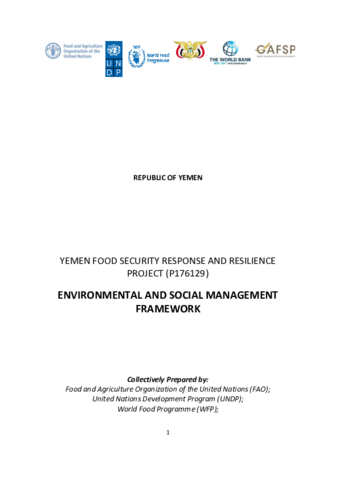
The Food Security Response and Resilience Project in Yemen finances a package of interventions delivered to almost 60 districts in the country. The proposed interventions, which will be implemented by FAO, UNDP and WFP over a four-year period, will improve the availability of and access to food and nutritious diets of households in the project’s target areas, and will enhance Yemen’s capacity to respond to food insecurity through the development of agricultural and social infrastructure. WFP will be responsible for providing Nutrition feeding assistance and Livelihoods (Food for Training) components under this project.
The Environmental and Social Management Framework is an instrument that has been prepared to meet the requirements of the World Bank’s Environmental and Social Framework (ESF), in particular the Environmental and Social Standard on the Assessment and Management of Environmental and Social Risks, including the World Bank Group Environment, Health and Safety (EHS) Guidelines. It also complies with Yemeni environmental and social laws and regulations.
The Stakeholder Engagement Plan (SEP) is an instrument that has been prepared to identify ways for WFP to reach the most vulnerable groups and communities affected by food security in Yemen, who can and should be targeted through WFP’s Nutrition and Livelihoods assistance under this project. The SEP has been created in accordance to the guidelines and requirements established in the Environmental and Social Standard 10 (“Stakeholders Engagement and Information Disclosure”) of the World Bank.
The Labour Management Procedures (LMP) for this project has been prepared to meet the objectives and requirements of ESS2 as well as the Yemeni national Labour Law. This LMP sets out the way in which project workers will be managed, in accordance with the requirements of national law and ESS2. The main purpose of the LMP is to identify the main labour requirements and risks associated with project and help the implementing agencies, including WFP, to determine the necessary resources to address the project labour requirements as mentioned in the LMP.
